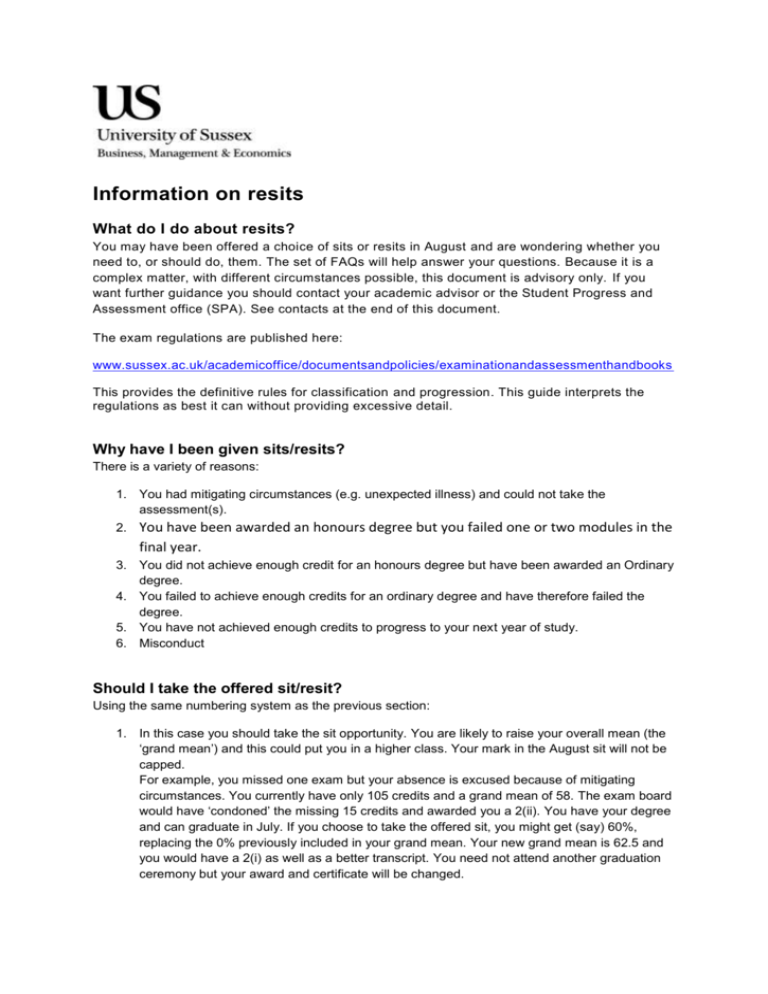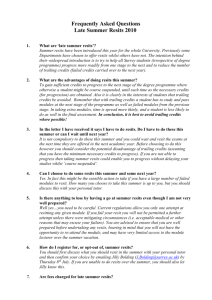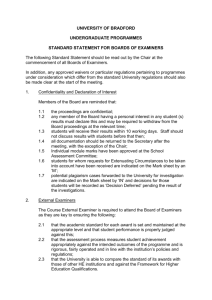Why have I been given sits/resits?
advertisement

Information on resits What do I do about resits? You may have been offered a choice of sits or resits in August and are wondering whether you need to, or should do, them. The set of FAQs will help answer your questions. Because it is a complex matter, with different circumstances possible, this document is advisory only. If you want further guidance you should contact your academic advisor or the Student Progress and Assessment office (SPA). See contacts at the end of this document. The exam regulations are published here: www.sussex.ac.uk/academicoffice/documentsandpolicies/examinationandassessmenthandbooks This provides the definitive rules for classification and progression. This guide interprets the regulations as best it can without providing excessive detail. Why have I been given sits/resits? There is a variety of reasons: 1. You had mitigating circumstances (e.g. unexpected illness) and could not take the assessment(s). 2. You have been awarded an honours degree but you failed one or two modules in the final year. 3. You did not achieve enough credit for an honours degree but have been awarded an Ordinary degree. 4. You failed to achieve enough credits for an ordinary degree and have therefore failed the degree. 5. You have not achieved enough credits to progress to your next year of study. 6. Misconduct Should I take the offered sit/resit? Using the same numbering system as the previous section: 1. In this case you should take the sit opportunity. You are likely to raise your overall mean (the ‘grand mean’) and this could put you in a higher class. Your mark in the August sit will not be capped. For example, you missed one exam but your absence is excused because of mitigating circumstances. You currently have only 105 credits and a grand mean of 58. The exam board would have ‘condoned’ the missing 15 credits and awarded you a 2(ii). You have your degree and can graduate in July. If you choose to take the offered sit, you might get (say) 60%, replacing the 0% previously included in your grand mean. Your new grand mean is 62.5 and you would have a 2(i) as well as a better transcript. You need not attend another graduation ceremony but your award and certificate will be changed. 2. Your failed modules were condoned by the exam board and you have got an honours degree and you can graduate at the July ceremony. You do not need to do anything more if you are happy with that outcome. However, some people want to pass all their modules (it might be needed for professional accreditation, for example). In this case you can take the resit and try to pass. The possible outcomes of your resit are: a. You pass, your mark becomes 40% (for resits, marks are capped at 40). This may help with any accreditation you need and will also raise your grand mean. This could raise your classification (but in most cases it will not). Every 10% points increase in your mark on the module will raise your grand mean by 0.75% points. b. You score lower on the resit than on the original exam. Your new mark counts! Hence you have worsened your position but this will not result in a lowering of any classification you have already been awarded. Hence if, for example, you have already got a 2(ii) you can resit a failed module to try to improve it without risking your 2(ii). 3. In this case you obtained 60 to 105 credits in your final year and the exam board did not condone the missing credits (because the stage mean was too low). This is enough for an Ordinary degree (60) but not enough for honours. You have the option of taking the Ordinary degree now and graduating in July, or taking resits in order to get an honours degree but you will not graduate in July. To obtain an honours degree you need to obtain at least 90 credits in the final year, with a stage (year) mean of at least 40. Hence you might be offered resits on four modules where you failed. You currently have 60 credits, so you would need to pass at least two of the four to gain honours, and satisfy the stage mean criterion. 4. In this case you have less than 60 credits in the final year. You will have been offered resits in failed modules. You will need to pass enough resits to satisfy the criteria for an Ordinary degree (a total of 60 credits) or Honours (90 credits and a stage mean of at least 40%). If you want to obtain a degree then you need to take the resits offered. You might not need to take all the resits offered: this might make revising easier but it increases the risk you do not pass a sufficient number of resits. The choice of strategy is yours in this case. 5. This is a slightly complicated matter. You need 120 credits to progress, i.e. to pass all your modules. Hence you will need to resit modules if you have not achieved this. To pass the resits you need 40% in each module to guarantee progression. 6. If the failure of a module is due to misconduct then you might not have enough credits for an Ordinary or Honours degree. You need to take the resit in order to gain the credit for the module. Are the sit/resit marks capped, and which mark counts: the sit or the resit? If you are taking a ‘sit’ then the mark is not capped. If you are taking a ‘resit’ then the mark is capped at the pass mark, which is 40. Please note: if you take a resit, it is the resit mark which counts, even if it is lower than the original sit mark. This means that there is a risk that you could make things worse for yourself. Hence it is probably not worth taking a resit in order to try to gain a few extra marks. Whether to take this risk is ultimately up to you. When do the resits take place? When will the precise timetable become available? The sit/resit exam period is 26 August 2013 to 6 September 2013 inclusive. The precise timing of the individual exams will be announced on 2 August 2013. See: www.sussex.ac.uk/spa/studentassessment/resits For sit/resit coursework deadlines, please see your Sussex Direct ‘Assessment Deadlines & Exam Timetable’. The resit exam board takes place on 11 September and the results will be posted as soon as possible afterwards. Contacts For queries about Economics resits: Michael Barrow: M.M.Barrow@sussex.ac.uk For queries about Business and Management resits: John Bateman J.Bateman@sussex.ac.uk For queries about mitigating evidence, etc: Fiona Marshall: F.Marshall@sussex.ac.uk For routine administrative enquiries you can contact the Economics or Business and Management course co-ordinators: ug-econ@sussex.ac.uk or ug-bam@sussex.ac.uk The School’s Director of Teaching and Learning, Julie Litchfield (J.A.Litchfield@sussex.ac.uk) can also be contacted about general teaching and assessment issues.






